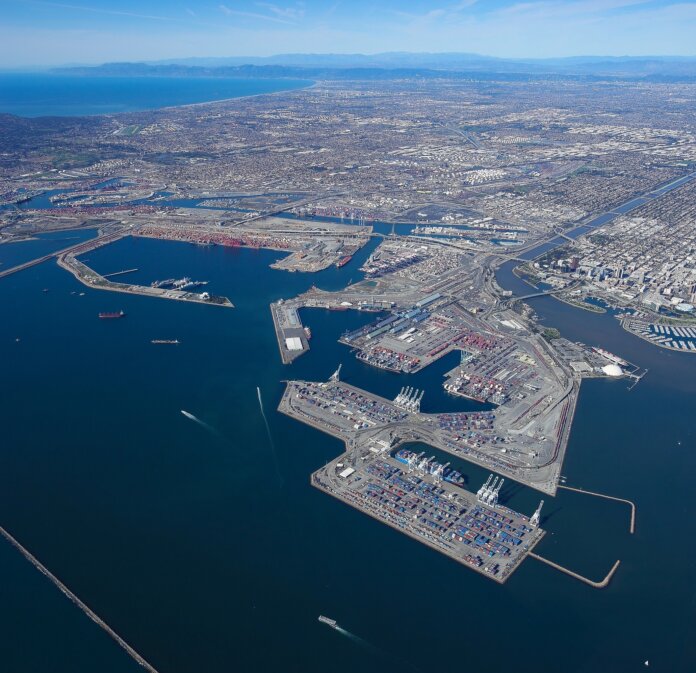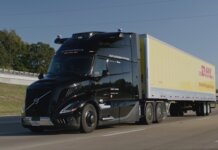The Harbor Commissions of the ports of Los Angeles and Long Beach have each adopted spending plans for the Clean Truck Fund (CTF) rate program, a key component of the ports’ Clean Air Action Plan (CAAP). The plans, approved separately by each port, target the development and deployment of zero-emission (ZE) trucks and infrastructure, and move the two ports closer to their CAAP goal of being serviced by a 100% zero-emission drayage truck fleet by 2035.
“It’s critical that we transition to a zero-emissions fleet,” says Long Beach Mayor Robert Garcia. “The Clean Truck Fund provides significant incentives for the trucking industry to phase out older, polluting trucks, for zero emissions technology. This is a monumental effort and helps the two largest cities in Los Angeles County to fulfill a shared commitment we’ve made to combat climate change.”
Under the CTF program, the Port of Long Beach and the Port of Los Angeles starting April 1 will begin collecting a rate of $10 per twenty-foot equivalent unit on loaded drayage trucks entering or leaving their container terminals. The program is expected to generate up to $90 million from the San Pedro Bay ports in its first year. Exemptions to the CTF rate will be provided for containers hauled by zero-emission trucks; containers hauled by low-nitrogen oxide-emitting (low-NOx) trucks will receive limited-time exemptions from the CTF rate.
“When it comes to confronting the climate crisis, Los Angeles doesn’t wait for solutions to show up on our doorstep – we forge a path for cities around the world to follow,” comments Los Angeles Mayor Eric Garcetti. “As we continue to move record-breaking cargo volumes through our port complex, the need for zero-emissions solutions has never been greater, and I’m proud to see our region leading on this first-of-its-kind step to steer our port toward cleaner air, lower emissions, and healthier communities.”
The CTF spending plans approved by the ports’ respective harbor commissions outline priority targets and pathways that will be used to disseminate the newly collected funds, including a truck voucher incentive program and an infrastructure funding program.
“California has some of the worst air pollution in the country, and government agencies have a responsibility to find solutions to protect health in vulnerable communities,” adds Steven Neal, Long Beach Harbor Commission’s president. “This is an important step and provides financial assistance to the trucking industry to buy new vehicles as we collaborate to deliver our goal of a zero-emissions truck fleet.”
To incentivize the purchase of ZE trucks that service the San Pedro Bay port complex, the two ports will provide first-come, first-served, point-of-sale ZE truck purchase vouchers for at least $150,000 to licensed motor carriers in the Port Drayage Truck Registry. Each truck funded will be obligated to provide drayage service to the San Pedro Bay Port complex for a period of three years.
“Our two ports have set a high bar for getting clean trucks on our streets, and this spending plan and its incentives will help accelerate that transition,” states Jaime Lee, Los Angeles Harbor Commission’s president. “We are the only port complex in the nation that is driving a changeover to cleaner trucks and broader zero-emission drayage truck technology commercialization to this magnitude.”
Modeled after existing federal, state and local grant programs and to be managed by a third-party administrator, this program could provide funds to help drayage licensed motor carriers to install or obtain ZE charging and/or fueling infrastructure. Funding could also be used to support public charging and fueling infrastructure for zero emission drayage trucks.
“We’re relieved the Ports of Los Angeles and Long Beach Ports are at long last acknowledging that zero emissions technologies are the only real solution to the surging port truck pollution problems,” says Adrian Martinez, staff attorney for Earthjustice. “Their decision to prioritize zero emissions is an important turning point for frontline communities who have long sought relief from the health burdens caused by living near the busiest port complex in the nation.”
“Everyone deserves clean air to breathe and opportunities to prosper from the green economy,” mentions Yassi Kavezade, a senior campaign representative for Sierra Club. We applaud the Port of LA and Long Beach on their plan to invest truck fees exclusively in zero-emission, battery electric technologies. Californians living near ports are on the frontlines of the state’s air quality crisis, a problem that has expanded during the pandemic.”
Read the Clean Air Action Plan here.





